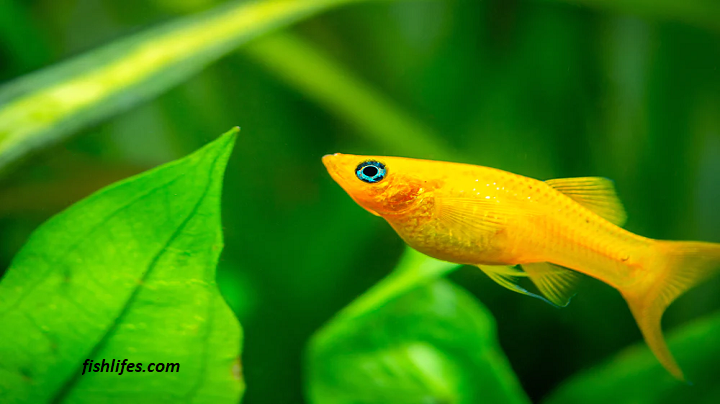Molly fish are a trendy aquarium addition and an absolute joy to own. But one question remains – do molly fish eat their own Poop? While this may seem strange, it’s important to know the answer if you are considering adding mollies to your aquarium.
This article will examine the facts surrounding molly fish and whether or not they consume their own feces.

Do Molly Fish eat their Poop?
Molly fish do not typically eat their Poop, but they could in some rare conditions. While they may nibble on the feces of other fish, this behavior is usually a sign of poor water conditions or a lack of nutrition in their diet.
It is important to ensure that your Molly fish have access to a healthy, balanced diet and clean and well-maintained aquarium conditions.
If moly is eating their Poop, it indicates several problems.
Is it Normal for Fish to eat Their Poop?
People are surprised to learn that it is not only expected but also beneficial. Fish produce waste as they consume food and excrete ammonia, which can be toxic in high concentrations. To help keep their environment safe and healthy, some fish will consume their feces to reuse any nutrients in the waste material.
Recycling the nutrients found in a fish’s feces is known as autophagy. It helps reduce the amount of excess waste that accumulates and keeps nitrogen levels in check, which is important for maintaining water quality.
Autophagy also ensures that any essential vitamins or minerals present in the fish’s diet are used more efficiently by providing an additional source of nutrition. As such, it may even help stimulate a fish’s appetite when other food sources are scarce.
What do Mollies eat?
Mollies, also known as molly fish, are freshwater aquarium fish renowned for their peaceful temperaments and vibrant colors.
As omnivores, they have a diverse diet containing plant matter and protein sources. The key to a successful molly aquarium is providing the right foods to keep them healthy and thriving.
Mollies need a variety of food sources to achieve balanced nutrition and maintain optimal health. Good options include high-quality flake or pellet food explicitly designed for fish like mollies and frozen or live meaty foods such as bloodworms and brine shrimp.
Feeding your Molly two or three times per day in small amounts is best; it’s also important to remember not to overfeed them as this can lead to pollution within the tank!
Do Mollies Poop a lot?
Yes, mollies do tend to produce more waste than other freshwater fish. This means regular tank and filter maintenance will be key to keeping the water clean and healthy.
Changing out at least 25% of your tank water each week is important while maintaining good quality filtration media. Additionally, you should feed your molly fish only what they can consume within three minutes twice daily – overfeeding can cause excessive waste production with any fish!
Reasons for Molly Fish to eat their Poop and how to Prevent it
There are several reasons for molly fish to eat there on Poop:
Malnutrition
Malnutrition in molly fish can be caused by several things, such as overfeeding, poor water quality, or insufficient nutrition.
When molly fish don’t get enough vitamins and minerals from their food, they may resort to eating their feces to find nutrients elsewhere. Eating feces does not provide adequate nutrition for any animal and should be avoided at all costs.
How to prevent
Some measures can be taken to prevent malnutrition in your molly fish. This problem can be prevented by providing the mollies with a proper diet and good water quality. Increasing the amount of food given to Molly can reduce this problem.
Internal Parasites
If molly fish eat their Poop, this behavior may signify internal parasites and other health problems and can be prevented with proper care.
If you suspect your molly fish has internal parasites, the first thing to do is to look for signs. You may notice an increase in scratching behaviors or if the water quality is not optimal for their tank habitat.
How to Prevent
Keep your tank clean by doing regular water changes and checking out the parameters regularly to ensure it’s healthy for your fish.
Feeding them high-quality food with proper nutrients will keep them healthy and reduce the chance of parasite infestation.
Curiosity
For molly fish, curiosity can cause them to explore their environment differently, including trying out the taste of their waste products.
Scavengers with an appetite for organic matter may find the excrement tasty; however, this habit should not be encouraged as it can pose health risks. Eating feces can spread diseases and make them more susceptible to illness or parasites.
How to Prevent
Please provide them with food on time to prevent curiosity in fish.
Water Quality Issues
When the tank’s water quality is compromised, Molly fish may begin eating their feces. Low oxygen levels, high ammonia content, or other environmental changes can all cause stress in Mollys that encourages them to eat their waste.
Additionally, inadequate nutrition or overcrowding can contribute to this behavior and lead to other health problems with the fish.
How to Prevent
Regular water changes and installing a good quality filter in the aquarium should be done to prevent this issue.

Molly Fish Poop Colors
The color of Molly fish poop can help you identify any problem with your pet’s health. It should be white or tan and may consist of small pieces or a single cylinder shape, depending on their food.
Changes in the color, consistency, or smell could indicate something wrong with your Molly’s diet or overall health.
If you notice that your Molly fish’s Poop has changed in color, it is important to investigate further by assessing its diet and water parameters. If all else checks out, you should consult a vet for advice and determine if there is an underlying issue causing this color change.
The most common type of Molly fish waste is dark greenish brown, considered normal. This occurs when Molly has been eating foods high in proteins and fats. If your Molly’s Poop changes to a whitish or yellowish hue, it could indicate that the food is not digesting correctly, or there may be an underlying health issue.
Aquarium Fish that eat Poop
Here are certain species of fish that thrive off of eating feces from other fish and their owners!
The most common type of aquarium fish to engage in this behavior is the Plecostomus. This bottom-dwelling catfish is known for its unique shape and size and its tendency to feed on algae, plant matter, and, yes – even feces.

While it can be a bit sickening at first thought, rest assured that these scavenging fish help keep your tank clean by consuming waste materials before they decay. They also help reduce the number of nitrates in the water, which can harm other inhabitants in your tank.
FAQ’s
What Breaks Down Fish Waste?
Beneficial bacteria break down fish waste in the aquarium environment. These bacteria convert ammonia, which is toxic to fish, into nitrites and nitrates. Nitrates are less harmful and can be removed from the aquarium with water changes or through live plants that absorb them as nutrients.
Does Fish Poop Float Or Sink?
It depends on the type of fish. Generally, most fish poop will sink to the bottom of the tank or pond because it is denser than water. However, some species, such as goldfish, produce lighter waste that can float for a short period before sinking.
Does Fish Poop Dissolve?
Yes, fish poop does dissolve. Fish waste is composed mainly of ammonia and urea, both highly soluble in water. This means that the trash can quickly dissolve into the surrounding water and be broken down by bacteria. As a result, fish tanks need to be cleaned regularly to avoid excess dissolved waste in the water.
How Often Should I Clean Fish Poop?
It depends on the size of your fish tank, but generally, it’s a good idea to clean out any visible fish poop weekly. Additionally, you should perform a complete water change every two weeks to keep the tank clean and healthy.
Do you have to Clean Fish Poop?
Yes, it is important to clean fish poop from your tank. This is because the waste can cause an increase in ammonia levels and other toxins in the water, which can be harmful to the fish. Regular water changes will help keep the tank clean and healthy for your fish.
Conclusion
In conclusion, Molly Fish sometimes eat their Poop when they don’t get enough food or nutrients. This behavior could be better, and it’s important to ensure your Molly Fish get the proper care and nutrition they need.
It’s also essential to keep the aquarium clean and free from excessive waste to prevent your fish from having to eat their own Poop. Furthermore, you should also monitor the food you feed them, as an improper diet can lead to ammonia poisoning and other health problems. It is always best to consult with a pet store professional or veterinarian if you are concerned about your Molly fish’s health and well-being.
Also, Know About Orange Back Fairy Wrasse Care ( A Fairy In The Fish World )
